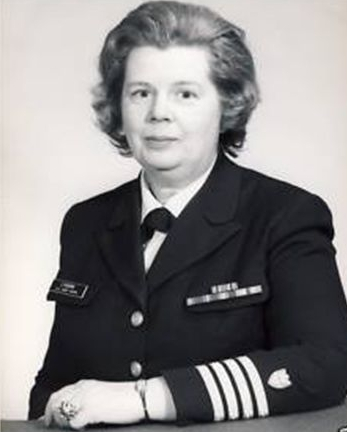
Frustrated by her clerical work as a civilian in 1944, Eleanor C. L’Ecuyer volunteered to join the Coast Guard in Boston, in the midst of her workday at Boston Edison Company.
“I went for a walk at the suggestion of my boss and came back a member of the Coast Guard,” she said beaming, some seven decades later.
L’Ecuyer, 90, served as a pharmacist’s mate at Coast Guard Air Station Port Angeles, Wash., until her discharge in 1946. While many women made their personal marks upon the Coast Guard, L’Ecuyer, an articulate gal with a sharp wit, forever impacted policies and increased opportunities for women serving in the Coast Guard.
Following her discharge after the war, L’Ecuyer returned to Boston, activating her G.I. Bill benefits and earning a law degree at Suffolk University. But finding employment as a female attorney proved challenging against the backdrop of 1950. Marriage and birthrates were increasing in post-war America. A postage stamp cost $.03, a dozen eggs $.65, the average household income was $3, 216 and the average home cost $14, 500. While nearly one million women entered the workforce each year, most found employment in the clerical field.
A few months passed while the venerable L’Ecuyer took a slew of physical exams. Ironically, on Apr. 1, 1951, she received two letters bearing good news.
“First I learned I’d passed the Coast Guard test,” she said. “Later that day, I learned I’d passed the Massachusetts Bar.”
Ensign L’Ecuyer was told she’d received a commission, but women could not attend Officer Candidate School. “Eventually, someone realized I was a lawyer, and I was promoted to lieutenant junior grade,” she said.
Assigned to Washington, D.C., she became the first female attorney hired by the United States Coast Guard, though she did not directly serve in that role. Her legal training would serve her – and future generations of female Coasties – very well. She wrote successful challenges to several policies that would increase career potential for women in the Coast Guard. One was her determination that being pregnant was not a disabling condition and therefore, should not be grounds for discharging women. Another was that couples should be allowed to co-locate. Another challenge she filed questioned the policy limiting women to serving only 20 years.
“After that one, the commandant asked if I had any other paperwork I might want to follow,” said L’Ecuyer, smiling.
She served until 1971, rising to the rank of captain – the highest rank a woman could achieve at the time. She also holds the distinction of being the longest serving SPAR. Yet, when asked if she realized how her determinations had impacted future generations, she turned reflective.
“It was the right thing to do, and the time had come” she said. “I put my law degree to good use.”
We honor you, Eleanor L’Ecuyer.
